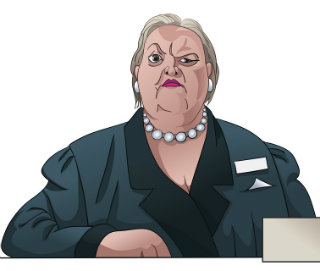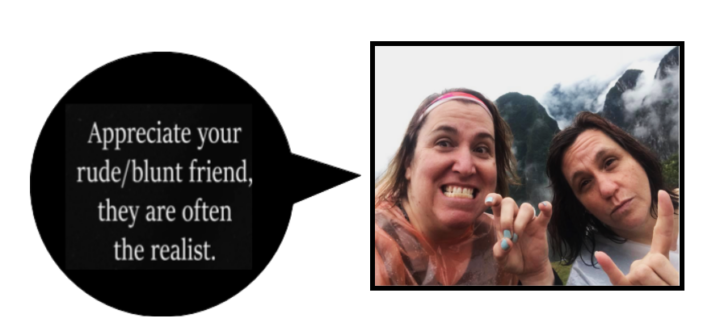Reject Rudeness – Keep School Climate Positive!
A MiddleWeb Blog
 As we move into the new year, let’s talk school climate. In the simplest terms climate can be defined as the feel or tone of the school or classroom. Schools that have positive climates are welcoming places where students, staff, and community members feel safe, cared about, challenged, and for the most part, happy.
As we move into the new year, let’s talk school climate. In the simplest terms climate can be defined as the feel or tone of the school or classroom. Schools that have positive climates are welcoming places where students, staff, and community members feel safe, cared about, challenged, and for the most part, happy.
A strong positive climate is essential for learning and for a happy healthy workplace. But, there are roadblocks to positive climates. Not just at school. Everywhere.
Sometimes people are rude. Have you ever noticed that? Yeah, of course you have. Heck, maybe sometimes you’re even the rude one. I know I am.
Take yesterday for example. Yesterday I went to the bank. The same bank that I’ve been using for almost ten years. Behind the counter was the same teller, who has served me for most of those years. I had never made a connection with her. She has never called me by name and rarely smiled at me. I could live with that. It seemed rude, but I could live with it.
Until yesterday. For whatever reason, that teller’s rude dismissal of me as a person finally pushed me over the edge. I walked out of the bank with a frown, my fists clenched, and enough negative attitude to fill any space I entered.
 My family, waiting in the minivan, had no idea of what was coming. I opened the door and immediately yelled at my son for making one of what seemed to be an endless stream of the strange noises that junior high school boys make. I snapped, “Knock it off! That sound is gross!” My son, shocked at my seemingly random anger, blamed his sister saying, “It’s your fault, idiot! You made that noise first!” My husband dropped a deep sigh, turned up the music loud, and ignored all of us. Every face in that minivan was a face of anger. And it was my fault. I had spread that teller’s rudeness like a disease.
My family, waiting in the minivan, had no idea of what was coming. I opened the door and immediately yelled at my son for making one of what seemed to be an endless stream of the strange noises that junior high school boys make. I snapped, “Knock it off! That sound is gross!” My son, shocked at my seemingly random anger, blamed his sister saying, “It’s your fault, idiot! You made that noise first!” My husband dropped a deep sigh, turned up the music loud, and ignored all of us. Every face in that minivan was a face of anger. And it was my fault. I had spread that teller’s rudeness like a disease.
Educators must remember that rudeness ripples. It is contagious and it makes everyone who comes into contact with it slump or simmer. Rude behavior can destroy a positive school climate.
Climate Matters…a LOT!
As I shared in my last post, I am now the principal of the school where I have served as the teacher-librarian for the last eight years. Truly, I want the teachers I serve (that’s right, I believe that a principal’s job is largely to serve the school community) to be happy. So, before I transitioned into my new role, I put out a survey to staff to help me guide my work.
One question asked teachers to rank the duties of a principal from most important to least important. The duties I asked teachers to rank are listed below in no particular order.
- Helping students with their behavior (discipline).
- Working to build a positive school climate.
- Connecting with community (including parents).
- Acting as an instructional leader.
- Providing professional development opportunities.
- Supporting teachers.
- Visiting classrooms.
My teachers ranked working to build a positive school climate as number one or number two by a reasonably big margin — 25 of 33 surveyed chose working on school climate as the first or second most important role of a school principal. The next highest in rank was supporting teachers, which 18 of 33 teachers ranked as number one or number two.
Given those results and my own understanding of the importance of positive climate, I spent a lot of time reading and pondering on how to improve it.
 Truly, I work in a great place with a very strong positive climate. Folks are, for the most part, kind, helpful, collaborative and polite (also super funny, but that’s a different topic, I think). The staff know and care about each other. Laughter frequently rings through the halls. Many of us spend time together outside of school and most are connected on social media.
Truly, I work in a great place with a very strong positive climate. Folks are, for the most part, kind, helpful, collaborative and polite (also super funny, but that’s a different topic, I think). The staff know and care about each other. Laughter frequently rings through the halls. Many of us spend time together outside of school and most are connected on social media.
I have an easy task when it comes to climate. I don’t have to remake it; I just have to work to preserve it. One way I plan to keep our school climate positive is to combat everyday rude behaviors, even when they seem minor.
The Ripples of Rudeness
As illustrated by my bank visit, experiencing rude behaviors can have deep and lasting impacts. The research on how rudeness does this is fascinating. Sarah DiGiulio summarizes it, saying rude interactions tend to ripple out and have lasting negative impacts. She writes, “We tend to ruminate about rude interactions—maybe talking about it with our friends, thinking about it later in the day, or letting it wake us up in the middle of the night.”
That is exactly what happened to me at the bank, and maybe it’s what happened to you when you experienced an everyday rude interaction. 
Think of a time someone was rude to you at school. Maybe they took the last cup of coffee or left the copy machine jammed. Or maybe when you walked into another teacher’s room he didn’t look up and greet you, or someone took the space where you always park. How did it make you feel? What did you do with that feeling?
DiGiulio points out that even when behaviors seem minor they may not be innocuous. Rudeness spreads and “instigates a self-perpetuating cycle of negative behavior, hampering our productivity, our happiness and our health along the way.”
Amazingly, the research shows that even witnessing rude behavior that is not personally directed at us is harmful! Clearly, given my new job as school principal, I need work hard to keep rude behaviors out of our buildings.
Good Riddance, Rude Behaviors!
Sometimes I fear that I come across as rude because I brought my big city mannerisms to the small midwestern “nice” town where I now live and work. I have asked teachers to call me out if I seem rude. Further, I have asked the entire staff to practice what I call “confronting with care” when we observe rude behavior from anyone.
Below is some advice for culling rude behavior that I shared with my staff. You might find it helpful, too. Use it for self-reflection, with your grade level, your PLC, or your family as a place to start a conversation. It might even be a good idea to share the information with students.
How to Avoid the Ripples of Rudeness Effect
1. Acknowledge people and express appreciation. The simple act of spreading appreciation can counteract rudeness in lasting ways. If you think something nice about someone, TELL HER/HIM! Take the time to share a kind word. You know what? I am going to make it a goal! My pledge to myself is to offer a written or verbal expression of appreciation to a someone who works in my school district twice each week. I will monitor the goal by tweeting examples using the hashtag #modelappreciation.
2. Smile at people and make eye contact. Every time. Don’t pass people in the hallways or outside without a simple acknowledgement. A smile, a head nod, or a wave is a small gesture, but it makes a big difference to climate.
![]() These days there is a common meme about folks who don’t smile a lot. The joke is that they have what’s called RBF Syndrome – a polite version might be “Resting Blank Face.” (Here’s the less polite one.)
These days there is a common meme about folks who don’t smile a lot. The joke is that they have what’s called RBF Syndrome – a polite version might be “Resting Blank Face.” (Here’s the less polite one.)
I don’t have RBF. In fact, my husband once commented, “Rita, I love that a smile is your default facial expression!” While it was one of the nicest compliments I’ve ever had, I know that it has less to do with my attitude than it does my DNA. I was born smiling and tend toward a Pollyanna-esque outlook. Not everyone runs around looking like a smiley-face emoji and that’s fine. But, a personal greeting and/or a quick smile can go a long way. Being cognizant of that is important.
3. Don’t let rude behavior fester. Talk to people when you are bothered. Teachers tend to follow the advice my mother always gave, “Suck it up, Buttercup!” While there is something to be said for letting rude behavior roll off of your back, there is also something to be said for clearing the air.
Don’t hold on to anger and let it morph into resentment. If someone is rude, confront her/him with care. The key is to not let your emotions or ego rule your response. Wait until you’re calm and then try saying in a calm, kind tone, “You may not have meant to be rude but when you __________, it made me feel __________. Can we talk about it?”
4. Think about how your actions might sit with others. People perceive things differently (I know, I know, duh…) This can be even more true in cross-cultural relationships. Learn about the people you spend time with; watch how they respond to you. Then, if you do offend or feel you might have, apologize. No need to make a huge deal out of it, but say you’re sorry if you’ve been rude or even if someone thinks you were rude and you feel you weren’t.
Try something like this, “I’m so sorry you felt I was rude. I didn’t mean to hurt you.” You’re not apologizing for actually being rude, but rather saying you’re sorry that someone felt you were. That’s just common kind behavior.
5. Assume best intentions. See folks’ better angels. Above, I made the extremely obvious point that people perceive things differently. Sometimes I think someone is being rude and later realize that it was not at all their intention. For five years I facilitated a PLC and one of our stated norms was “Assume best intentions!” It helped remind us to not jump to negative conclusions but rather to positive ones. It made a difference in how we operated.
6. Avoid rude people like the plague. Even though I am a smiley-faced, rose-colored glasses wearing Pollyanna, I get that sometimes no matter how hard we try, we’re going to bump up against folks who are habitually and even intentionally rude. In those cases the best likely course of action it to avoid them as much as possible.Then, when it’s impossible and you have to spend time together, I urge you to do as I tell my kids to do, “Find the funny!” Think of that rude person as a character in a sitcom. You know, an Archie Bunker (All in the Family) or Dr. Cox (Scrubs) or literally anyone on It’s Always Sunny in Philadelphia or Seinfeld. Those rude/mean characters are funny! See if you can giggle a little to melt the sting of rude folks away. (Not at them, of course! But maybe later when you go home and vent with your spouse or another friend.)
A Couple of Quotes and a Picture
I am going to close this post with a couple of quotes that summarize my thoughts.
Etiquette does not render you defenseless. If it did, even I wouldn’t subscribe to it. But rudeness in retaliation for rudeness just doubles the amount of rudeness in the world.
~Judith Martin (“Miss Manners”)
A dying culture invariably exhibits personal rudeness. Bad manners. Lack of consideration for others in minor matters. A loss of politeness, of gentle manners, is more significant than is a riot.
~Robert A. Heinlein
I don’t want my school climate (culture) to die, Robert. So I am going to try to nip rudeness in the bud!
As I was writing this piece, my sister (left, me right) posted the quote below on her Facebook page. I promise you, it was a total coincidence! There’s a little truth in her quote… so, I don’t know… maybe I shouldn’t take rudeness too seriously either.
What do you think? (And maybe I do have a RBF!)



































Thank you so much for your post. I enjoyed reading every word of it.
I am so glad you liked it! Thank you!